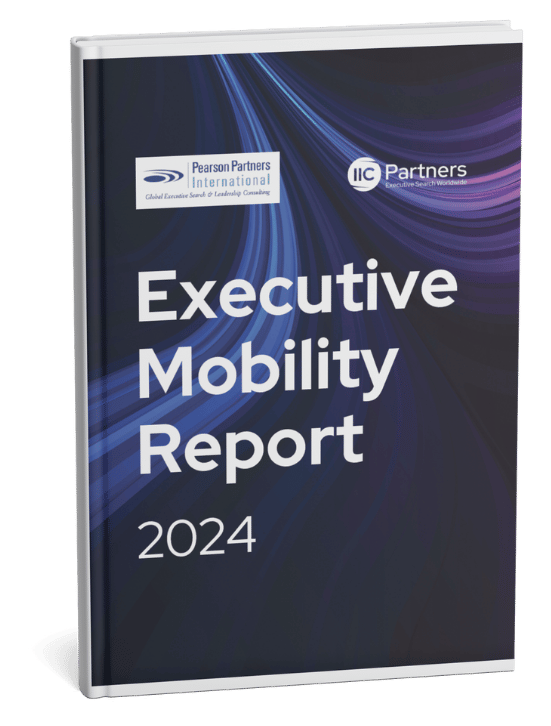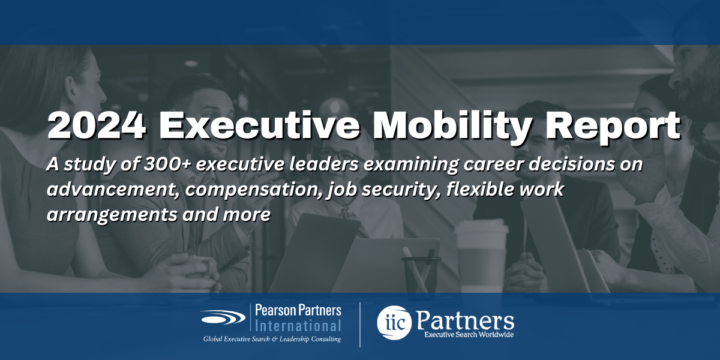2024 Executive Mobility Report – Pearson Partners International & IIC Partners
Pearson Partners International is a proud member of IIC Partners, one of the world’s top ten global executive search organizations. Together, we are pleased to present our 2024 Executive Mobility Report, which comprehensively analyzes career mobility motivations and trends among senior executives. Understanding what drives executives to seek new opportunities is essential for organizations to attract and retain top talent—particularly when 86% of executives are open to new opportunities, as revealed in our study.
We surveyed over 300 executive leaders to uncover the primary factors influencing their career decisions, including career advancement, competitive compensation, job security and flexible working arrangements.
Key insights from the report reveal that executives are highly open to considering new roles, underscoring the competitive landscape for top-tier talent. The study also emphasizes the importance of company culture and mission and the impact of remote work options in executive decision-making processes. Additionally, it highlights the pivotal role of executive search consultants in connecting organizations with hidden talent pools.
Executive Mobility: 8 Key Insights
- High Executive Mobilility
-
- 86% of executives are open to new opportunities.
- 36% are actively seeking new roles.
- 50% would be receptive if approached by an executive recruiter.
- The Power of Employer Branding
-
- 33% prioritize company culture, mission, impact or remote working options over compensation when considering new positions.
- Causes of Failed Hires
-
- 43% have regretted a career move.
- Chief reasons for this regret include poor cultural fit, inaccurate job descriptions and limited growth opportunities.
- Access to Hidden Talent
-
- 51% have made unplanned career moves after being contacted by executive search consultants.
- This receptiveness highlights the role of executive search in reaching passive candidates.
- High Willingness to Relocate
-
- 81% are open to domestic relocation.
- 43% are willing to relocate internationally.
- This openness to relocation shows adaptability among senior leaders.
- Impact of Negative Management on Retention
-
- 40% have left positions due to negative relationships with direct managers.
- This loss of valuable employees highlights the need for organizations to prioritize leadership development.
- Necessity of Compensation Progression
-
- 55% believe changing jobs is necessary to increase compensation.
- This perception indicates potential gaps in salary progression within current organizations.
- Prevalence of Offer Acceptance Withdrawals
-
- 40% have retracted job acceptances to pursue alternative offers.
- The top reasons for these withdrawals include compensation, job security and company culture.
 |
– Christine Hayward, Executive Director, IIC Partners |
Industry and Functional Differences
The report also explores variations across industries and functions. These differences underscore the importance of customizing your recruitment and retention strategies to align with the distinct motivators of individuals within your target industries and roles.
- Consumer Markets
-
- 66% value remote working options highly, above the global average of 54%.
- 26% prioritize job security when considering new opportunities, compared with the 21% average.
- Financial Services & Insurance
-
- 17% consider company culture the top factor in new job considerations, versus the 11% average.
- 20% prioritize stock options for retention, exceeding the average of 9%.
- Industrial
-
- 61% are very likely to recommend their employer, higher than the global average of 52%.
- 17% prioritize pension and savings plans for retention, nearly double the average of 9%.
- Life Sciences and Healthcare
-
- 38% consider compensation the top factor when evaluating new jobs, above the 30% average.
- 25% are unwilling to consider relocation, compared with the global average of 16%.
- People and Culture
-
- 31% are actively searching for new jobs, slightly lower than the global average of 36%.
- 32% cite job security as a top retention factor, significantly higher than the 21% average.
 |
– Renee Arrington, Vice-Chair, Americas, IIC Partners |
Additional Insight
The survey concluded with an open-ended question: “If you could change one thing about your job, what would you change?”
While many executives focused on remote and hybrid working arrangements, compensation and benefits, and achieving better work-life balance, nuanced perspectives also emerged, notably concerns about AI and automation. Executives expressed a desire for better automation to enhance productivity. Some called for increased research into the safety of artificial intelligence and the potential scale of job losses before expanding AI use.
These insights reflect a growing awareness of how technological advancements impact job satisfaction and security. They also highlight the importance for organizations to address technological concerns and to consider the implications of AI and automation on their workforce.
Conclusion
Understanding these trends in executive mobility is vital for organizations to develop effective talent acquisition and retention strategies. The insights from our global executive search consultants help businesses build and sustain robust leadership pipelines.
 |
Download the full report PDF for our comprehensive analysis and detailed insights. |
Related Posts
- ← The Future of Leadership: Balancing AI Empowerment with Human Excellence
- Future Texas: Industry and Innovation in the Texas of Tomorrow →
















